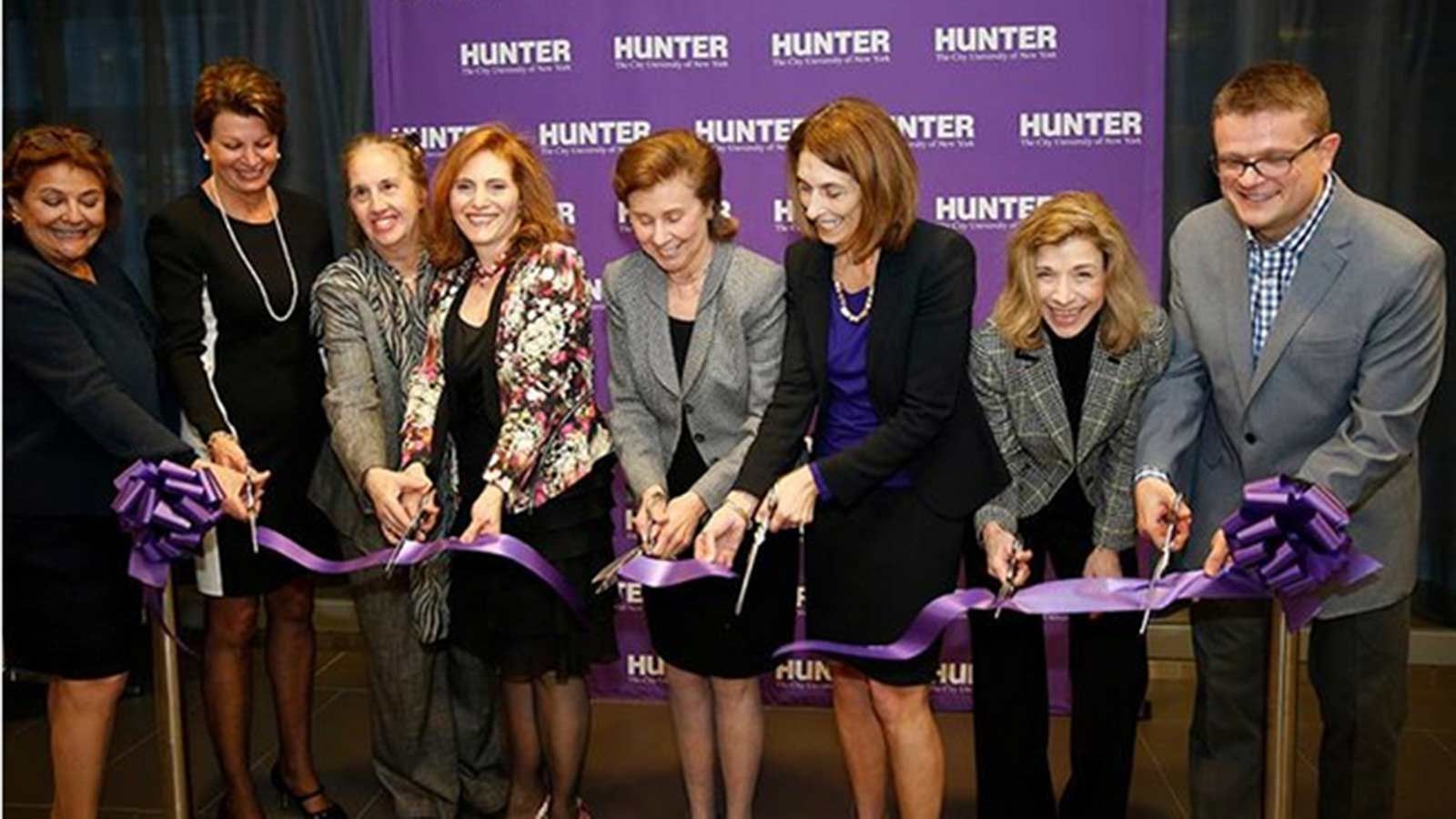Hunter College President Jennifer J. Raab and Dr. Laurie H. Glimcher, the Stephen and Suzanne Weiss Dean of Weill Cornell Medical College (WCMC) today announced the official opening of Hunter’s new 21,000-square-foot laboratory and research space on the fourth floor of Weill Cornell Medical College’s Belfer Research Building. The opening of Hunter's floor in the Belfer Building marks the next step in a new, innovative partnership between two of New York City's most prominent public and private educational institutions.
Hunter Celebrates Opening of New Research Space in Belfer Research Building

Officials from Hunter and Weill Cornell Medical College cut the ribbon on the new laboratory.
“I'm thrilled to welcome Hunter to the Weill Cornell Campus. Our two institutions have a shared mission of championing biomedical research and scientific discovery to improve the health of people in New York and beyond, and together we’re on a path to do just that.”
Dr. Laurie H. Glimcher, WCMC
“This space represents the incredible things an Ivy League school and a public college, located just a few city blocks apart, can achieve when they work together,” said Hunter President Jennifer J. Raab. “In these labs, Hunter scientists—doing cutting-edge research in biology, infectious disease, bioimaging, computational genomics and nanotechnology—are getting the modern facilities that their work deserves. Better yet, the next generation of scientists will be trained in these labs for the creation of future biomedical breakthroughs targeting cancer, cardiovascular disease, children's health, neurodegenerative diseases such as Parkinson's and Alzheimer's, along with global health and infectious diseases. We are truly grateful to our partners at Weill Cornell Medical College community for their ongoing commitment to Hunter and their recognition that supporting these kinds of research-intensive work and learning spaces will be key to future scientific advancement.”
“I’m thrilled to welcome Hunter College and its scientists to the Belfer Research Building and the Weill Cornell campus,” said Dr. Laurie H. Glimcher, the Stephen and Suzanne Weiss Dean of Weill Cornell Medical College. “Our two institutions have a shared mission of championing biomedical research and scientific discovery to improve the health of people in New York and beyond, and together we’re on a path to do just that.”
Under the partnership, Hunter purchased the 4th floor of the new Belfer Research Building to collaborate with WCMC to train the next generation of scientists. The entire 13-floor Belfer building is devoted to translational bench-to-bedside research. Labs within Belfer are all constructed bullpen-style, designed to serve as a nucleus wherein physician-scientists, educators, students and researchers from Hunter and Weill Cornell can collaborate on the latest discoveries and research breakthroughs. As part of Hunter's relocation to the Belfer Research Building, twelve Hunter College faculty members, along with graduate students and staff, moved from space on the College's main campus at 68th Street and Lexington, including labs that were originally constructed in the 1930s.
The ribbon-cutting event was co-hosted by Helen L. Appel, a Cornell University alumna who serves on the Board of the Hunter Foundation, and also teaches at Hunter College’s School of Continuing Education. Mrs. Appel’s husband, Robert J. Appel, serves on Hunter College’s Music Advisory Board and is also an undergraduate alumnus and former trustee of Cornell University.
Chancellor James B. Milliken of the City University of New York stated: “This splendid new home for Hunter College scientists and their students is another benefit of CUNY’s decade-long expansion of science research and education. Encompassing 21,000 square-feet in Weill Cornell Medical College’s magnificent new Belfer Research Building, this state-of-the-art facility is the product of a unique partnership between Hunter and Weill Cornell Medical College in which Hunter researchers will collaborate with Weill Cornell scientists—a significant step in CUNY’s drive to forge partnerships with leading institutions and play a key role in the city’s fast-growing science and technology economy.”

